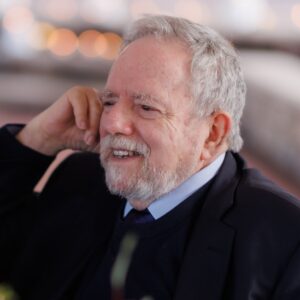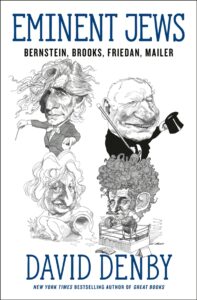Betty Friedan worked so hard she forgot to pee. Norman Mailer was married twice in four days. The only way to get Leonard Bernstein out of bed was to play the piano so badly he’d be forced to get up and put an end to it. Mel Brooks kept a black comb firmly secured to his upper lip to mock his favorite führer.

Eminent Jews: Bernstein, Brooks, Friedan, Mailer by the former New Yorker film critic David Denby, published by Henry Holt and Co. in April, uses four Jewish artists and activists in postwar America to personify the symbiotic relationship between Jews and American culture. The result is a romp through the feral culture of the mid-20th century, from Brooks’s Brooklyn to Mailer’s Provincetown and beyond.
This month, Denby, who also wrote the best-seller Great Books, Lit Up, and other books, will be discussing Eminent Jews here — on July 12 at East End Books in Provincetown and on July 24 at the Wellfleet library in conversation with James Carroll. Denby and his wife, novelist Susan Rieger, are long-time summer visitors in Wellfleet.
Eminent Jews chronicles a time when it was hard — as it is now — to turn on a TV without encountering talented people who are Jews. “There needs to be more work, both celebratory and critical, devoted to the American Jews exercising liberty after the Second World War,” Denby writes. “What are the conditions that led to cultural achievement? What kind of personal qualities enabled it?”
Worthy questions — but he doesn’t answer the first one. Instead, he resorts to nostalgia and patriotism (at one point, he fawns over George Washington’s “active embrace of all good citizens,” including Jews). Seeking more serious answers — “working out the social and economic patterns, and their intersection with cultural figures” — is a task for scholars, not him, Denby writes.
The book’s exciting characters — and Denby’s devotion to fully appreciating their unique achievements — makes for an enjoyable read, although the chapters bear little relation to each other, and these eminent Jews barely make appearances in each other’s stories. The cute details and fun facts remain, for the most part, just that.
The actual work of connecting the dots between these four characters is left for the reader, and Denby doesn’t exactly make it easy. Still, an image emerges of how Jews molded music, literature, and humor out of complex ethnic experiences.
The experiences he describes don’t always show an America that welcomed Jews with open arms. Comedian Mel Brooks — born in 1926 on a kitchen table in Brownsville, Brooklyn — was drafted into the Army in 1944, where the other soldiers called him things like “Jewboy.” Once, Denby reports, Brooks was punished after he smashed a metal tray into an anti-Semite’s head. This wasn’t exactly what you would call a warm embrace into the open-minded country George Washington envisioned.
In lieu of a college education, Brooks hit the Jewish Catskills, both before he left for the Army and upon his return. The so-called Borscht Belt was where many Jews (in part because they were not welcome elsewhere) went to while away their summers, court the opposite sex, and, of course, laugh. Brooks’s brand of physical comedy and knack for Hitler jokes won him many fans.

So, what is the relationship between Brooks’s Judaism and his creativity? It’s hard to say, but Denby writes that these four eminent Jews are special in part because “they did not suffer from the confusion and constraint of so many American Jews in the 1930s” who “thought it best to keep quiet and not draw attention to themselves.” But Denby’s stories of these four figures make their suffering plain.
Anti-Semitism and the Holocaust shaped the lives of Denby’s other subjects, too. Bernstein, a conductor and composer, was denied membership in clubs at Harvard because he was Jewish. Mailer, a poster boy for the confused and constrained, wrote to try to escape from a stereotype of Jews as weak, benign, and asexual. In high school, Friedan, a feminist activist, was rejected from sororities for being Jewish. “Being Jewish made me an observer, a marginal person,” she is quoted saying, “and I made one of those unconscious vows to myself: ‘They may not like me but they’re going to look up to me.’ ”
“They were free in ways that Jews had never been free in any society of the past,” Denby writes, correctly. But freedom doesn’t account for great art; more often, the struggle for freedom does. The eminent Jews’ suffering made them stronger, or at least more riled up, but they were also immensely lucky. That story is in Denby’s book, too.
The four people Denby profiles — born between 1918 and 1926 — were children and young adults during an anti-Semitic time but blossomed into a less hateful world. Both of those eras, not just one or the other, made them what they were. It was in the postwar world that they could finally channel their childhood suffering into art, activism, and Hitler jokes. George Washington deserves little of the credit.
Culture Watch
The event: David Denby talks about Eminent Jews
The time: Saturday, July 12, 6 p.m. and Thursday, July 24, 7 p.m.
The place: East End Books, 389 Commercial St., Provincetown (July 12) and Wellfleet Public Library (July 24)
The cost: Free; RSVP at eventbrite.com for July 12



